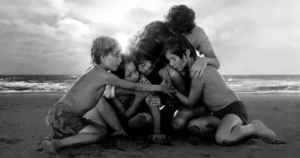Seven Movies That Depict the Downside of Motherhood


Written and verified by the psychologist Sharon Laura Capeluto
In an ideal world, motherhood would be solely a source of positive emotions. The desire to be a mother would be firm and unquestionable. Pregnancy and childbirth would be experiences full of harmony. Patience and fairness would abound. In fact, a child’s upbringing would be perfect and the mother’s state of mind stable. Love would be unquestionable.
However, in the real world, things are more complex. Indeed, motherhood has many precious highlights but also has a downside that’s often characterized by feelings of impotence, frustration, fear, doubts, and even pain.
What differences are there between real motherhood and motherhood depicted in the movies? Are mothers always euphoric when they’ve just given birth? Is breastfeeding always a warm and unhindered experience? Is the news of pregnancy consistently experienced with deep joy and the mother-child bond always stable? Anyone who’s been through the experience of motherhood knows that the answers are complex.
Real motherhood in the movies
Let’s be honest, motherhood has many faces. It can be fun and enjoyable, but also deeply painful. It has both upsides and downsides. For instance, our babies’ smiles give us joy, but their crying also keeps us awake at night and they’re often exhausting.
The story told on the big screen is often biased. That said, this isn’t always the case, and here’s a sample of movies that tell the story of motherhood from a more realistic perspective.
1. Roma
This movie received a Golden Globe for being the best foreign film of 2019. It was directed by Alfonso Cuarón and tells the story of a wealthy family in Mexico in the 1970s.
Cleo is a domestic worker who takes care of the children in the family. She loves them and they feel the same about her. In fact, she plays an essential role in raising the four little ones since she’s in charge of feeding them, taking them to school, putting them to bed, and waking them up, while the biological mother is immersed in a tense and difficult marriage.
The protagonist, Sofía, eventually finds herself having to face her own motherhood and is invaded by feelings of insecurity, rejection, guilt, and fear.
2. Bad moms
Bad Moms (2016) portrays how mothers are required to keep everything under control and systematically put their children’s needs before their own. It’s a movie for laughing and reflecting on the unrealistic pressures and demands that society places on mothers.
Mila Kunis plays Amy, a mother who cares for everyone but herself. She could be considered a prodigious juggler. In fact, her life is intertwined with endless tasks and responsibilities that she must fulfill perfectly.
3. We Need to Talk About Kevin
This is a deeply raw and uncomfortable psychological drama starring Tilda Swinton and Ezra Miller. Motherhood here has a problematic and painful essence that goes way beyond the limits of what’s healthy.
We Need to Talk About Kevin (2011) is the adaptation of the homonymous novel by Lionel Shriver that deals with the dysfunctional bond between a mother and her son. She doesn’t love him and he seems to have developed a manipulative and sociopathic personality, perhaps due to that absence of attachment.
Kevin commits atrocities that seem destined to turn his mother’s life into a living hell.
4. Juno
The plot revolves around Juno, a teenager who becomes pregnant after having sex with a friend. She’s faced with decisions that are way beyond her maturity level. For instance, whether to terminate the pregnancy or give the baby up for adoption.
This 2007 film directed by Jason Reitman touches on controversial issues. The desire to be a mother or not, the supposed maternal instinct, and freedom of choice. Without a doubt, it’s one of the first movies to bring to the table a reality that’s been hidden for a long time.
5. The Lost Daughter
The Lost Daughter (2022) proposes to demystify the romanticization of motherhood and reveal rawer stories, but no less likely or impossible for that.
Leda (Olivia Coleman) is a 48-year-old woman with tormenting memories of her past who’s vacationing alone. Her feelings intensify when she establishes a bond with a young mother, with whom she shares a spa on a paradisiacal beach. Guilt reigns in the protagonist for not having played the role of mother as society expects: loving, affectionate, and self-sacrificing.
6.Lady Bird
This movie, written and directed by Greta Gerwig, honestly expresses the bond between a teenager in transition to adult life and her mother. In fact, it reveals how complex it can be to have a child of this age.
The protagonist is forging and affirming her identity. However, this seems to go against her mother’s beliefs and lifestyle. She really wants and needs to differentiate herself from her mother while, at the same time, staying close to her.
7. Leonera (Lion’s Den)
This is an Argentine production. It’s co-written and directed by Pablo Trapero and stars Martina Gusmán. It deals with the topic of motherhood in prison.
The movie is full of violence, frustration, and anguish. It portrays the life of Julia, a woman who discovers that she’s pregnant during a medical check-up before she goes into prison. Her child is born in prison and spends her first few years there.
There’s conflict in the relationship between the protagonist and her mother as the two don’t agree on what’s best for the little girl.
In an ideal world, motherhood would be solely a source of positive emotions. The desire to be a mother would be firm and unquestionable. Pregnancy and childbirth would be experiences full of harmony. Patience and fairness would abound. In fact, a child’s upbringing would be perfect and the mother’s state of mind stable. Love would be unquestionable.
However, in the real world, things are more complex. Indeed, motherhood has many precious highlights but also has a downside that’s often characterized by feelings of impotence, frustration, fear, doubts, and even pain.
What differences are there between real motherhood and motherhood depicted in the movies? Are mothers always euphoric when they’ve just given birth? Is breastfeeding always a warm and unhindered experience? Is the news of pregnancy consistently experienced with deep joy and the mother-child bond always stable? Anyone who’s been through the experience of motherhood knows that the answers are complex.
Real motherhood in the movies
Let’s be honest, motherhood has many faces. It can be fun and enjoyable, but also deeply painful. It has both upsides and downsides. For instance, our babies’ smiles give us joy, but their crying also keeps us awake at night and they’re often exhausting.
The story told on the big screen is often biased. That said, this isn’t always the case, and here’s a sample of movies that tell the story of motherhood from a more realistic perspective.
1. Roma
This movie received a Golden Globe for being the best foreign film of 2019. It was directed by Alfonso Cuarón and tells the story of a wealthy family in Mexico in the 1970s.
Cleo is a domestic worker who takes care of the children in the family. She loves them and they feel the same about her. In fact, she plays an essential role in raising the four little ones since she’s in charge of feeding them, taking them to school, putting them to bed, and waking them up, while the biological mother is immersed in a tense and difficult marriage.
The protagonist, Sofía, eventually finds herself having to face her own motherhood and is invaded by feelings of insecurity, rejection, guilt, and fear.
2. Bad moms
Bad Moms (2016) portrays how mothers are required to keep everything under control and systematically put their children’s needs before their own. It’s a movie for laughing and reflecting on the unrealistic pressures and demands that society places on mothers.
Mila Kunis plays Amy, a mother who cares for everyone but herself. She could be considered a prodigious juggler. In fact, her life is intertwined with endless tasks and responsibilities that she must fulfill perfectly.
3. We Need to Talk About Kevin
This is a deeply raw and uncomfortable psychological drama starring Tilda Swinton and Ezra Miller. Motherhood here has a problematic and painful essence that goes way beyond the limits of what’s healthy.
We Need to Talk About Kevin (2011) is the adaptation of the homonymous novel by Lionel Shriver that deals with the dysfunctional bond between a mother and her son. She doesn’t love him and he seems to have developed a manipulative and sociopathic personality, perhaps due to that absence of attachment.
Kevin commits atrocities that seem destined to turn his mother’s life into a living hell.
4. Juno
The plot revolves around Juno, a teenager who becomes pregnant after having sex with a friend. She’s faced with decisions that are way beyond her maturity level. For instance, whether to terminate the pregnancy or give the baby up for adoption.
This 2007 film directed by Jason Reitman touches on controversial issues. The desire to be a mother or not, the supposed maternal instinct, and freedom of choice. Without a doubt, it’s one of the first movies to bring to the table a reality that’s been hidden for a long time.
5. The Lost Daughter
The Lost Daughter (2022) proposes to demystify the romanticization of motherhood and reveal rawer stories, but no less likely or impossible for that.
Leda (Olivia Coleman) is a 48-year-old woman with tormenting memories of her past who’s vacationing alone. Her feelings intensify when she establishes a bond with a young mother, with whom she shares a spa on a paradisiacal beach. Guilt reigns in the protagonist for not having played the role of mother as society expects: loving, affectionate, and self-sacrificing.
6.Lady Bird
This movie, written and directed by Greta Gerwig, honestly expresses the bond between a teenager in transition to adult life and her mother. In fact, it reveals how complex it can be to have a child of this age.
The protagonist is forging and affirming her identity. However, this seems to go against her mother’s beliefs and lifestyle. She really wants and needs to differentiate herself from her mother while, at the same time, staying close to her.
7. Leonera (Lion’s Den)
This is an Argentine production. It’s co-written and directed by Pablo Trapero and stars Martina Gusmán. It deals with the topic of motherhood in prison.
The movie is full of violence, frustration, and anguish. It portrays the life of Julia, a woman who discovers that she’s pregnant during a medical check-up before she goes into prison. Her child is born in prison and spends her first few years there.
There’s conflict in the relationship between the protagonist and her mother as the two don’t agree on what’s best for the little girl.
All cited sources were thoroughly reviewed by our team to ensure their quality, reliability, currency, and validity. The bibliography of this article was considered reliable and of academic or scientific accuracy.
- Cáceres-Manrique, F. D. M., Molina-Marín, G., & Ruiz-Rodríguez, M. (2014). Maternidad: un proceso con distintos matices y construcción de vínculos. Aquichan, 14(3), 316-326.
- Galván Vega, B., & Murvartian Carrascal, L. (2018). Tenemos que hablar de Kevin: Una lectura desde la psicoterapia sistémica y la teoría del apego. Recorriendo los caminos de la mente: Narrativa y psicología.
- Gómez, C. M. V. (2018). Tenemos que hablar de Kevin (2011). La violencia filio] parental. Revista de Medicina y Cine, 14(1), 13-19.
- Verea, C. P. (2004). “Malas madres”: la construcción social de la maternidad. Debate feminista, 30, 12-34.
This text is provided for informational purposes only and does not replace consultation with a professional. If in doubt, consult your specialist.







